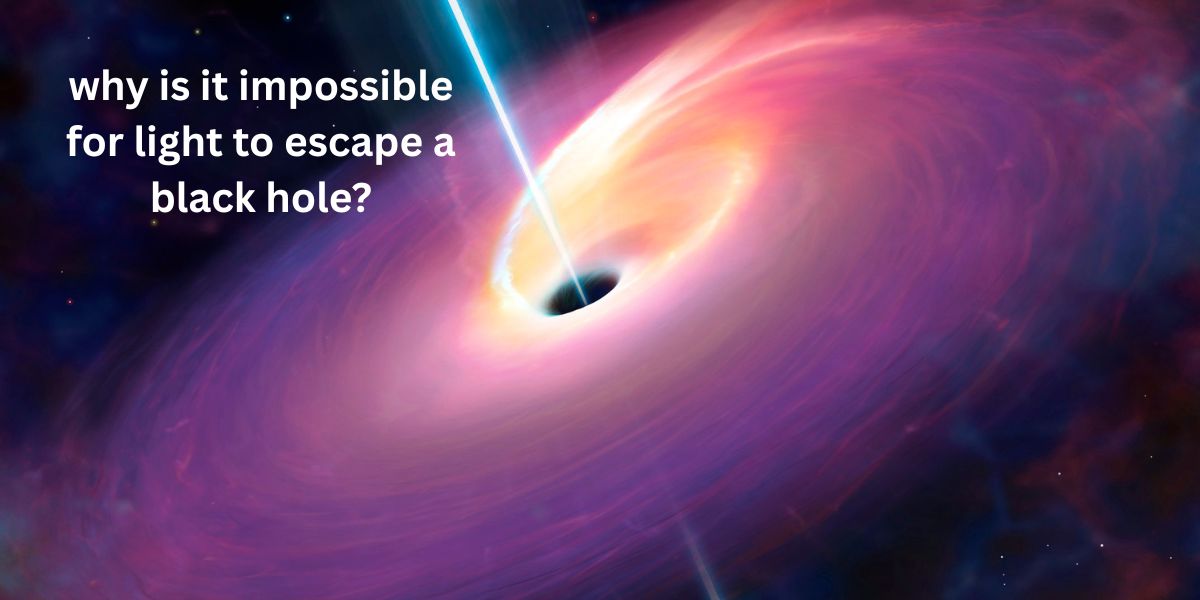Have you ever wondered what happens inside a black hole? Black holes are some of the strangest and most powerful objects in space. They are so strong that nothing—not even light—can escape their pull. Imagine throwing a ball into the air, and instead of coming back down, it disappears forever. That’s what happens to light near a black hole!
But why can’t light escape? Light is the fastest thing in the universe, so why does it get trapped? The answer lies in gravity, the invisible force that keeps us on the ground and holds planets in orbit. Black holes have gravity so strong that they bend space and time. If light tries to leave, it gets pulled back in like a fish caught in a whirlpool.
So, how does this work? Let’s find out!
What Is a Black Hole?
A black hole is a place in space where gravity is extremely strong. It forms when a massive star collapses under its own weight. The star’s core squeezes into a tiny point called a singularity. Around it is the event horizon—the point of no return.
- Think of it like a cosmic vacuum cleaner—once something crosses the event horizon, it can’t come out.
- Black holes are invisible because no light escapes them. Scientists find them by watching how they affect nearby stars and gas.
- They come in different sizes—some are as small as a city, while others are billions of times heavier than the Sun!
How Does Gravity Work in a Black Hole?
Gravity is the force that pulls things together. The more mass something has, the stronger its gravity. Earth’s gravity keeps us from floating away, but a black hole’s gravity is much stronger.
- At the center of a black hole, gravity is so strong that space and time bend.
- Light travels in straight lines, but near a black hole, space bends so much that light gets trapped.
- It’s like running on a treadmill that’s too fast—no matter how fast you go, you can’t move forward.
Why Can’t Light Escape a Black Hole?
Light is made of tiny particles called photons. These photons normally zip through space at the fastest speed possible. But black holes have a secret weapon: their escape velocity.
- Escape velocity is the speed needed to break free from gravity. On Earth, rockets need to go about 40,000 km/h to escape.
- For a black hole, the escape velocity is faster than light—and nothing is faster than light!
- Once light crosses the event horizon, it’s like falling into a bottomless pit. There’s no way out.
What Happens to Light Inside a Black Hole?
Once light enters a black hole, it gets pulled toward the center—the singularity. Here, the laws of physics as we know them break down.
- Space and time get twisted so much that past, present, and future might not exist the same way.
- The light doesn’t “die”—it just becomes part of the black hole, making it stronger.
- Some scientists think light might get stretched into infinite wavelengths, but no one knows for sure!
Can Anything Escape a Black Hole?
Normally, nothing escapes a black hole. But Stephen Hawking discovered something surprising—Hawking radiation.
- Tiny particles near the event horizon can escape, causing the black hole to slowly lose energy.
- This process takes trillions of years, so black holes don’t disappear quickly.
- Even Hawking radiation can’t bring back light—it’s still trapped forever.
What Would Happen If You Shined a Flashlight Into a Black Hole?
If you pointed a flashlight at a black hole, the light would behave in a strange way.
- At first, the light would bend toward the black hole like a river flowing into a drain.
- As it gets closer, time would slow down—an outside observer would see the light freeze at the event horizon.
- Finally, the light would vanish, becoming part of the black hole’s darkness.
Conclusion
Black holes are mysterious and powerful. Their gravity is so strong that even light—the fastest thing in the universe—can’t escape. Once light crosses the event horizon, it’s gone forever, trapped by the black hole’s incredible pull.
Scientists are still learning about these cosmic monsters. Who knows? Maybe one day, we’ll discover even stranger secrets hiding inside them.
📌 Frequently Asked Questions
How are black holes formed?
Black holes form when massive stars collapse. The star’s core squeezes into a tiny point, creating a super-strong gravitational pull.
Can a black hole destroy Earth?
Only if one gets very close. The nearest known black hole is far away, so Earth is safe for now.
What is the event horizon?
It’s the “point of no return” around a black hole. Once something crosses it, escape is impossible.
Do black holes last forever?
No, they slowly lose energy through Hawking radiation and may disappear over trillions of years.
Can we see a black hole?
Not directly, but scientists detect them by observing their effects on nearby stars and gas.
What is inside a black hole?
We don’t know for sure. The laws of physics break down at the singularity.
How big can black holes get?
Some supermassive black holes are billions of times heavier than the Sun!
Could a black hole suck in the whole universe?
No, black holes only pull in things that get too close. The universe is too big for that.
Is time different near a black hole?
Yes! Time slows down near a black hole due to its extreme gravity.
Are there white holes?
Some theories suggest white holes (the opposite of black holes) might exist, but none have been found yet.
